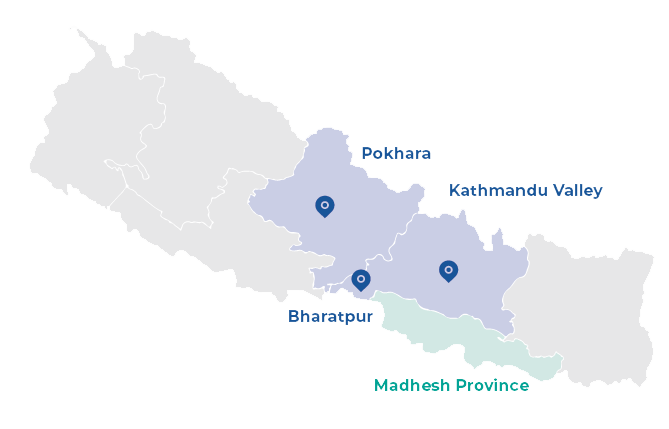TA 6526-NEP : SASEC power Transmission and Distribution System Strengthening Project: Implementation Support for Gender Equality and Social Inclusion Project

Background
The South Asia Subregional Economic Cooperation (SASEC) Power Transmission and Distribution System Strengthening Project (PTDSSP) (the project) aims to reinforce and modernize power supply system in and around Kathmandu Valley in Bagmati Province. This project also will begin strengthening distribution systems outside of Kathmandu in a systematic and phased manner starting with the sub-metropolitan Bharatpur area of Chitwan district in Province 3 and Pokhara of Kaski district in Province 4 where power supply interruptions are frequent and prolonged. The project also will support Province 2 where the quality of electricity supply is poor and around 20% of households are still without access to the national grid. The project is aligned with the following impact(s): reliable and efficient electricity for all by 2030 achieved (National Energy Crisis Reduction and Electricity Development); and Energy trade infrastructure in SASEC countries improved (SASEC Operational Plan Update, 2016–2025). The project has the outcome of: access, reliability, efficiency of power supply in Nepal improved through following outputs.
Output 1: Power system transmission capacity increased.
Output 2: Distribution systems in Kathmandu Valley, Bharatpur and Pokhara, and consumers’ awareness on energy efficiency and safety improved.
Output 3: Distribution network and capacity of women to use electricity for energy-based enterprises in Province 2 improved.
This Technical Assistance (TA-6526-NEP) will contribute to the overall objective of the SASEC (South Asia Sub-regional Economic Cooperation Power Transmission and Distribution System Strengthening) project. Specifically, it will support NEA to strengthen its GESI mainstreaming process in a manner that ensures social inclusion while improving the access, reliability and efficiency of power supply throughout the country. At the same time, it will demonstrate a pro- poor and gender-responsive service delivery model in Province 2, including productive use of energy, electric cooking and employment generation. By doing so, it is expected to contribute to the national goal of 100% electricity access by 2022, including supporting the government’s priority on electric cooking, as reflected in the new tariff structure that encourages the use of electricity by the poor and disadvantaged for cooking.
The key objective of the assignment is to implement the planned activities under the TA in line with international best practices and provide required deliverables. This assignment will focus on main two outputs as follows:
1: Strengthened capacity of NEA to implement approved strategy, operational guidelines and manuals of GESI.
2: Increased capacity of women, poor and the marginalized to use electricity efficiently and productively.
For effective implementation and considering the synergies between various tasks, activities in the ToR are clustered under three Intervention Areas:
Intervention Area 1: Capacity building and institutionalization of GESI in NEA
Intervention Area 2: Skill building and energy-based livelihoods in province 2
Intervention Area 3: Community level awareness creation on GESI issues, energy-based livelihoods and electric cooking
| Location | Siraha, Saptari, Sarlahi, Bara, Parsa, Dhanusa, Mahotari, Rautahat |
| Donor Organization | ADB and SIDA / |
| Beneficiary | 500 NEA staffs, 600 HHs, 11000 people |
| Budget | USD 1,127,233 |
